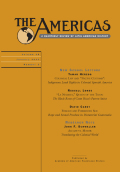
AMERICAS
Scope & Guideline
Fostering Scholarly Dialogue on American Histories.
Introduction
Aims and Scopes
- Transnational Historical Perspectives:
The journal emphasizes the interconnectedness of historical events across national borders, exploring how local histories relate to broader transnational narratives. - Cultural and Social Dynamics:
A core focus is on the cultural and social dynamics within various communities, examining issues of race, gender, and class in historical contexts. - Indigenous Studies and Decolonization:
The journal highlights indigenous histories and perspectives, promoting discussions around decolonization and the rights of indigenous peoples throughout the Americas. - Political History and Social Movements:
Research often explores the political histories of the Americas, including revolutions, social movements, and the impact of colonialism and imperialism. - Economic History and Labor Studies:
The journal investigates the economic aspects of historical narratives, including labor relations, economic systems, and the implications of globalization. - Environmental History:
There is a growing focus on environmental history, examining the interactions between societies and their environments, particularly in relation to colonial and post-colonial contexts.
Trending and Emerging
- Intersectionality and Social Justice:
Scholarly work increasingly emphasizes intersectional approaches that examine the interconnectedness of race, gender, class, and other identities in historical contexts, advocating for social justice. - Globalization and Its Impacts:
As globalization continues to shape the Americas, research is focusing on its historical roots and implications, particularly in relation to migration, economic systems, and cultural exchanges. - Environmental Justice:
There is a growing emphasis on environmental justice, exploring how historical narratives intersect with issues of environmental degradation and the rights of marginalized communities. - Decolonial and Anti-Colonial Studies:
Emerging themes include decolonial perspectives that challenge traditional colonial narratives and advocate for the recognition of indigenous knowledge systems and histories. - Digital Humanities and Historical Methodologies:
The use of digital tools and methodologies in historical research is on the rise, allowing for new ways to analyze and present historical data and narratives.
Declining or Waning
- Traditional Military History:
There has been a noticeable decrease in publications focused solely on traditional military history, with scholars increasingly integrating these narratives into broader social and cultural contexts. - Eurocentric Historical Narratives:
Research that centers primarily on Eurocentric perspectives is less frequent, as the journal shifts towards more inclusive approaches that prioritize indigenous and marginalized voices. - Historical Biographies of Prominent Figures:
The focus on detailed biographies of historical figures is waning, as there is a trend towards collective and community histories rather than individual-centric narratives. - Colonial Administration Studies:
Research specifically focused on the administrative aspects of colonial governance appears to be less prevalent, with more interest in the lived experiences of individuals and communities during these periods. - Static Cultural Analysis:
There is a move away from static analyses of culture, favoring dynamic approaches that consider the ongoing evolution and interaction of cultural identities across time.
Similar Journals
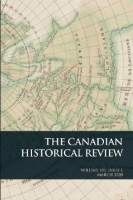
CANADIAN HISTORICAL REVIEW
Unveiling the Layers of Canadian History and Religious Studies.The Canadian Historical Review serves as a premier scholarly journal dedicated to fostering research and discourse in the fields of history and religious studies, published by the esteemed University of Toronto Press. With an ISSN of 0008-3755 and an E-ISSN of 1710-1093, this journal has been a vital contributor to the academic landscape since its inception, continuing to provide a platform for innovative research and critical analysis from 1978 to the present. Recognized in the Q2 category for both History and Religious Studies in 2023, it ranks in the top tier of its field, positioning itself as an essential resource for scholars eager to explore diverse topics in Canadian history and beyond. While the journal does not currently operate under an Open Access model, it remains highly regarded for its rigorous peer-review process, ensuring the highest standards of academic integrity. The editorial board is committed to expanding the boundaries of historical inquiry, making it a cornerstone for researchers, professionals, and students alike who seek to deepen their understanding of the past.
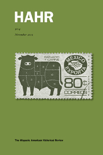
HAHR-Hispanic American Historical Review
Fostering Insightful Dialogues on Hispanic American ExperiencesHAHR-Hispanic American Historical Review, published by DUKE UNIVERSITY PRESS, is a prestigious scholarly journal dedicated to the field of Latin American and Hispanic studies. With its ISSN 0018-2168 and E-ISSN 1527-1900, this journal boasts a remarkable reputation, as evidenced by its Q1 ranking in both Cultural Studies and History for 2023, placing it among the top tier of its category. The journal has consistently contributed to academic discourse since its inception in 1962, with a notable convergence of historical scholarship focused on the Hispanic American experience through 2024. HAHR is not open access, ensuring its publication standards resonate within a scholarly context that emphasizes rigorous peer review and academic integrity. Housed in the vibrant academic community of Durham, NC, this journal serves as an essential resource for researchers, professionals, and students alike, providing critical insights and fostering a deeper understanding of Hispanic heritage and history.
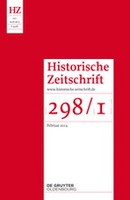
Historische Zeitschrift
Unveiling Narratives of the Past, Shaping the FutureHistorische Zeitschrift is a prestigious academic journal dedicated to the field of history, published by WALTER DE GRUYTER GMBH. Established in 1859, the journal has a long-standing legacy of promoting scholarly discourse and research that spans pivotal eras from the 19th century to contemporary times. With an ISSN of 0018-2613 and an E-ISSN of 2196-680X, it is well-recognized in the academic community for its rigorous standards and contributions to historical scholarship. This journal is currently positioned in Quartile 3 of its category for 2023 and holds a respectable rank of #762 out of 1760 in Scopus, placing it in the 56th percentile for Arts and Humanities – History. Though not available in an open access format, Historische Zeitschrift continues to attract submissions from both emerging and established historians eager to contribute to an understanding of historical contexts and narratives. Its scope includes extensive historical analysis, discussions on methodology, and explorations of sources, making it an invaluable resource for researchers, professionals, and students alike who seek to deepen their insights into historical developments.

NEW ZEALAND JOURNAL OF HISTORY
Exploring New Zealand's Past, Shaping Tomorrow's HistoriesThe New Zealand Journal of History is a preeminent scholarly publication dedicated to the field of historical research, focusing on the rich and diverse history of New Zealand from both national and global perspectives. Published by the University of Auckland, this journal serves as a vital platform for historians, researchers, and students to engage with novel ideas and scholarly discourse. Although it is not an open-access journal, its impact within the academic community is underscored by its consistent ranking within the Scopus database, where it holds the position of rank #681 out of 1328 in the Arts and Humanities category, reflecting a commendable percentile of 48th. Covering essential years of publication from 1978 to 2019, the journal offers a comprehensive archive of articles that explore various historical themes and methodologies. By providing a critical examination of New Zealand's past, the New Zealand Journal of History plays an essential role in inspiring further research and understanding of historical contexts, making it indispensable for historians and students alike.

Journal of Belgian History-Revue Belge d Histoire Contemporaine-Belgisch Tijdschrift voor Nieuwste Geschiedenis
Advancing Scholarship in Belgian HistoryThe Journal of Belgian History-Revue Belge d'Histoire Contemporaine-Belgisch Tijdschrift voor Nieuwste Geschiedenis is a prominent academic publication dedicated to the exploration and analysis of contemporary Belgian history. Published by SOMA-CEGES, this journal serves as a vital resource for researchers, professionals, and students alike, providing a platform for scholarly discourse and the dissemination of innovative research in the field. Despite its historical significance, the journal faced a hiatus in its Scopus coverage from 2019, yet it retains a strong identity within the Arts and Humanities category, holding a Scopus rank of #1123 out of 1328, placing it in the 15th percentile. This underscores the opportunities for growth and impactful contributions within the journal's scope. By focusing on the intricacies of Belgian history, the journal encourages rigorous investigation and a deeper understanding of Belgium's past, making it an essential reference for anyone interested in European historical narratives.
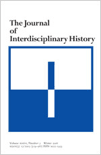
JOURNAL OF INTERDISCIPLINARY HISTORY
Fostering Scholarly Dialogue in Diverse Historical ContextsThe JOURNAL OF INTERDISCIPLINARY HISTORY, published by MIT PRESS, serves as a pivotal platform for scholarly discourse at the intersection of history and various interdisciplinary fields. With a rich publication history dating back to 1970, the journal has continually provided a critical forum for exploring innovative historical methodologies and themes that resonate across diverse academic domains. Although it is not an Open Access journal, it remains invaluable for researchers dedicated to advancing the understanding of historical narratives and their implications within contemporary contexts. As reflected in its impressive Scopus ranks, the journal occupies a respectable position within its quartiles, holding Q3 in History and Q4 in History and Philosophy of Science. This suggests a growing recognition of its contributions among scholars in the field. Located in Cambridge, MA, USA, the journal is accessible to a global audience, fostering collaboration and dialogue among professionals, historians, and students alike. Whether you are a seasoned researcher or a budding student, the JOURNAL OF INTERDISCIPLINARY HISTORY stands as an essential resource for navigating the complexities of historical inquiry.

Journal of Early American History
Cultivating Knowledge of America's BeginningsThe Journal of Early American History is an esteemed academic publication dedicated to the exploration and analysis of early American history, providing a critical platform for research and discourse in this vital field. Published by BRILL, a leader in scholarly publishing based in the Netherlands, the journal is indexed under ISSN 1877-0223 and E-ISSN 1877-0703. With its scope covering a range of topics that intersect cultural studies and historical inquiry, the journal holds significant ranks in both the Arts and Humanities and Social Sciences categories, achieving a notable Q3 ranking in History and Q4 in Cultural Studies as of 2023. This positioning underscores its relevance and contribution to contemporary debates surrounding early American narratives, society, and culture. While currently non-open access, the Journal of Early American History fosters an environment for researchers, professionals, and students alike to delve into pioneering scholarship from 2011 to the present, ensuring continued engagement with the complexities of America’s formative years. Its esteemed reputation for nurturing innovative research solidifies its role as a crucial resource for anyone dedicated to the scholarly study of early American history.

Revista Historia Autonoma
Exploring the Rich Tapestry of Autonomous HistoriesRevista Historia Autonoma, a prominent journal in the field of autonomous historical studies, is published by the ASOC HISTORIA AUTONOMA based in Madrid, Spain. Since its inception in 2012, this Open Access journal has offered a platform for the dissemination of research that explores the diverse histories and cultural narratives within autonomous regions. The journal aims to foster scholarly dialogue and innovation by providing researchers, professionals, and students access to high-quality articles that illuminate lesser-known historical contexts. With its commitment to accessibility, Revista Historia Autonoma plays a crucial role in advancing the study of regional histories, making it an essential resource for those engaged in historical research and scholarship.
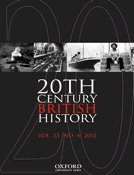
Twentieth Century British History
Exploring the complexities of modern Britain.Twentieth Century British History, published by Oxford University Press, stands as a pivotal scholarly journal in the field of historical research, specializing in the rich tapestry of British history during the twentieth century. With an esteemed impact factor and a notable position within the top Q1 quartile of history journals, it ranks impressively in the Scopus database, securing the 234th position out of 1,760 journals in Arts and Humanities, placing it in the 86th percentile. This rigorous academic platform, active since its establishment in 1990, not only contributes to the sophistication of historical discourse but also encourages interdisciplinary dialogue among historians, sociologists, and cultural studies scholars. Though it does not currently offer open access options, the journal provides invaluable insights, critical analyses, and innovative perspectives aimed at enriching the understanding of Britain’s past and its implications for contemporary society. Researchers, professionals, and students alike will find Twentieth Century British History an essential resource for exploring and appreciating the complexities of modern history.

PACIFIC HISTORICAL REVIEW
Illuminating Diverse Narratives of the Pacific RegionPACIFIC HISTORICAL REVIEW, published by the University of California Press, serves as a pivotal academic journal in the field of History. With a robust ISSN of 0030-8684, this journal has been dedicated to examining the intricate narratives and themes of the Pacific region since its inception in 1967. Recognized for its scholarly contributions, it holds a commendable Q3 ranking in the History category for 2023 and is positioned in the 58th percentile among its peers in the Scopus database. The journal offers a platform for rigorous research and interdisciplinary dialogue, aiming to illuminate the diverse historical experiences and cultural complexities of the Pacific. While it does not provide open access, it remains an esteemed publication for researchers, professionals, and students seeking in-depth analyses and scholarly discourse in the rich tapestry of Pacific history.